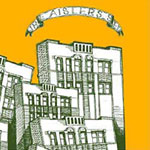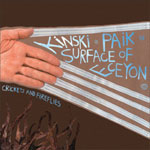Recent Listening
| |
 |
With their debut album Terrible
Things Happen, and follow-up The Last Match, multifarious
writer/player/producer Amy Linton and her San Francisco based band, The
Aislers Set, trumpeted a faux-naif reform that skirted between twee ideology
and sharp songcraft. Strengthened by indelible melodies, How I Learned
to Write Backwards (Suicide Squeeze) follows a similar trend, and
is a fully blossomed testimony to the potential of the group's strategic
difference. Each track has been complied with economic mastery, attention
being directed to the beauty of structure and fluidity of form. ´Mission
Bells' is an audible itch of dirty spanish-influenced guitar solos and
lush symphonic realism, whilst ´Emotional Levy' thrives on a base of
handclaps, harmonies, and an ambitious mural of surrealistic sound. Linton's
restless, effective guitar style combined with her lo-fi avant garde
virtuosity- and a voice as soothing as warm honey, allows The Aislers
Set to move on from sloppily styled indie-pop, whilst exposing important
contradictions and ambivalences to that very same genre. Paul O'Hara's Senseless Acts of Beauty (an uncredited journalist's inversion, adopted as a free mandate in 90s San Francisco, urging anonymous public benevolence- and subsequently the title of George Mackay's book on cultures of resistance since the 60s) contains ten compositions, mostly played on a Wurlitzer piano. Framed by the dragging somberness of accompanying double bass and cello, O'Hara's minimal pastoralism and nuanced shades of tonality recall the elegant post rock classicism of Rachel Grimes, or Brian Eno's temperamental Obscure collection- as his delicate compositional hand and allowance for accidents always rewards with a darker hue. A shame, then, that this British instrumentalist has ducked under the allusive shadow of a fairly cult notoriety, having spent the nineties working on soundtracks, studying sonic art, and playing saxophone on the avant rock scene through bands like Celeste, Dunderhead, Hub, and Transmission. Senseless Acts of Beauty (Sonoris) has been arranged in a light, positive capacity, chipping different colours into the mix whilst re-interpreting the texture aspects of jazz (Wurlitzer, double bass), folk (acoustics, flutes), and classical (cello, grand piano). In the same way that Jonathan Richman used to employ a blunt, charming Brechtian amateurity to his musical sphere, Daniel Johnston's self-conscious lisp, trist lyrical sentimentality, and gawky piano playing cannot help but be endearing in their childishness because they so wonderfully blur the adult relationship between rhetoric and logic. Johnston's regressive, introverted lyrics are invariably about love, and border on playground poetry (´You make the sun...shine, you make the wine...fine' he howls on ´Syrup of Tears'). But again, like Richman, this disruptive curb between sophistry and immaturity is Johnston's baseboard for punk rock of the most purified sense; music that reproduces itself by ceaselessly assaulting its own foundations. The very elements that should make Fear Yourself (Gammon) problematic- its challenge of conventional song-writing, its technical dissonance, its well judged obliqueness- are in fact the agents of durable power. |

| Crickets and Fireflies is
the second in a series of releases by Connecticut based label The Music Fellowship.
The concept behind the exercise is that each release contains three individual
yet complimentary bands, with each band dominating an exclusive 20 minute
shaft of post rock improv and angular, free form white noise. Last year's
compilation was divided between Yellow6, Rothko, and Landing. This time round,
first musical duties fall to the Seattle quartet, Kinski. Their track, ´Keep
Clear of Me, I am Maneuvering With Difficulty' initiates with ten minutes
of dynamically spare, tepid soundscaping before hurtling headlong into a
propulsive shock of early Neu! lock-grooves and stunningly spasmodic wildness.
Paik's ´Spanish Holiday' runs avenues with My Bloody Valentine favouring,
as it does, a complex and untidy wash of heavily delayed guitars and shimmering
tangents of motorik destruction. Surface of Eceyon's atmospherics, meanwhile,
establish a beguiling intuitiveness- ´Concert of Stars' is a spirited guide
of imagination, its treated synthesizers evoking the uneasy feeling of being
lost in space. Puerto Muerto's second album, Elena (Fire), has a fantastic dragonfly like quality, in which the Chicago husband-wife duo extend their gothic alt-country with free rein experimentalism. Christa Meyer and Tim Kelley's long, fluent ratios of simple but supple notes are endlessly bifurcating and refuse to stop short of new possibilities, or to follow straight lines. All noises and textures are relatively low-key. Despite using a wealth of musical aids, each track is cleanly divided in its use of sound, so that no instruments are left cloying for space. The album's only instrumental piece, ´Licht', is governed by a maze of gently grazing sitar, without intervention of Meyer's operatic vocals, which flutter between classically disdainful and darkly hypnotic. The clotted ambiance of ´Pretty Girls' is where her voice is especially suited, as fractures of digital shivers are caressed beneath her whirling, highly effected melodies- which, at times, manage to sound as though they are fading away down an gurgling plughole. Deerhoof's catchy, cubist grime is often played down to it's barest components, proceeding with an enthusiastic, if imprecise, dissection. The San Francisco riot-rock quartet have a fascinating ability to maintain total control of their seemingly chaotic make-up, managing to layer inventive and catchy melodies over an explosive, yet harnessed energy. Satomi Matsuzaki's vocals dart backwards and forwards, rising from bitter cotton candy whisper to opulent howl, whilst the spiky relationship between the two guitarists (Chris Cohen, John Dieterich) releases discordant notes that bite straight into the pop jugular. Surprisingly then, the surface of the record is remarkably flat and untextured, preferring instead to offer subliminal fragments of dramatically treated sound in coarse flashes. Apple O' (Kill Rock Stars) is an impressively diligent record in which no idea, experiment, or impulse is neglected, and yet, at the same time, a curiously centre-less one. With a tendency to flutter through songs like a one-winged butterfly, Apple O' is tenderly manipulated blast of electro-punk, flushed with fresh poignancy. © 2003 Mia Clarke |